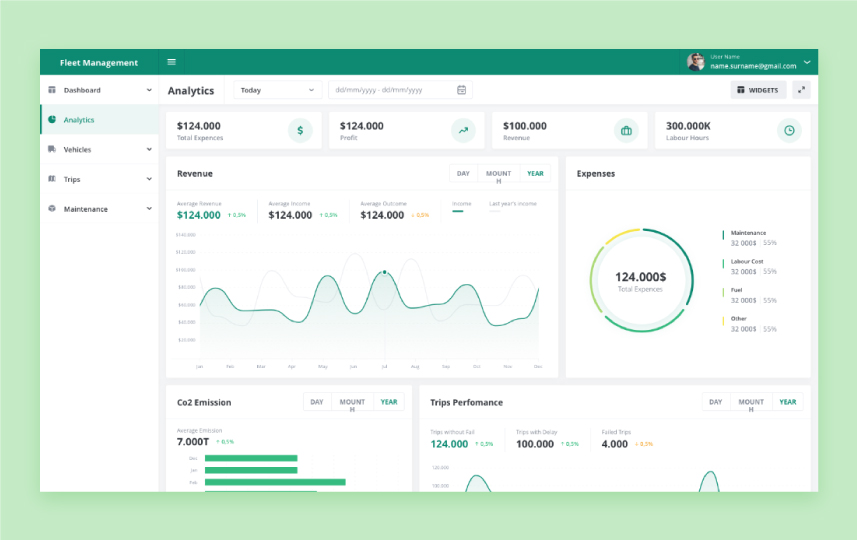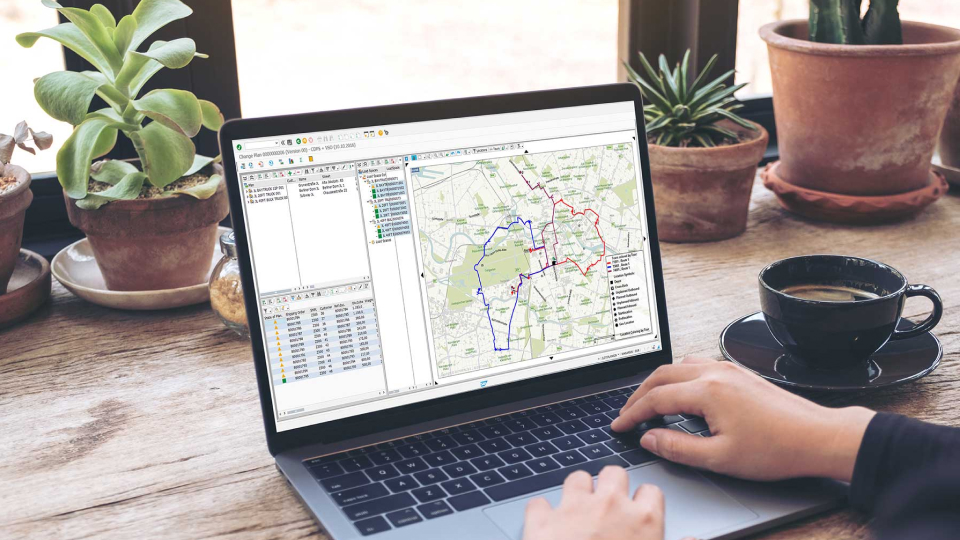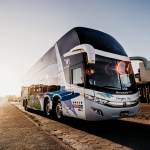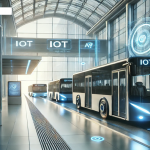
How to Grow Your Bus Business by Using AI & Automation
Running a bus business today comes with a unique set of challenges. Operational inefficiencies, fluctuating passenger demand, rising fuel costs, and complex route planning can make it difficult to maintain profitability and customer satisfaction. To address these issues, it’s crucial to explore modern solutions. In such a competitive landscapes, how to grow your bus business hinges on adopting innovative strategies that leverage technology.

AI and automation are transforming the transportation industry by optimizing routes, predicting passenger demand, and automating routine tasks like ticketing and maintenance scheduling. These technologies provide data-driven insights, enabling operators to make smarter decisions, reduce downtime, and improve service efficiency. Embracing AI and automation not only streamlines operations but also enhances the passenger experience, positioning your business for long-term growth and success.
How AI & Automation Are Redefining Bus Business Ideas
AI and automation are transforming the bus industry by creating smarter and more efficient ways to run operations. AI involves using machines to perform tasks that usually require human intelligence, such as learning from data and making decisions. Automation, on the other hand, uses technology to handle repetitive tasks without the need for human intervention. Together, these technologies bring substantial improvements to transportation.

Key innovations like machine learning help systems analyze data to improve route planning and predict passenger demand more accurately. Predictive analytics leverages historical data to forecast trends, such as peak travel times, enabling operators to better plan their services. The Internet of Things (IoT) connects buses, sensors, and infrastructure, providing real-time data on vehicle performance and safety. Meanwhile, automated workflows simplify processes like ticketing, scheduling, and maintenance, minimizing operational delays.
By embracing these technologies, bus businesses can enhance operational efficiency, reduce costs, and improve the passenger experience, leading to exciting new opportunities for growth.
Maximize Your Bus Passenger Transportation Business Growth with AI & Automation
AI and automation offer game-changing benefits for bus businesses, driving growth and efficiency like never before. From streamlining operations to enhancing customer satisfaction, these technologies help companies stay competitive in a rapidly evolving market. By leveraging AI-driven insights and automated processes, bus operators can overcome traditional challenges and unlock new opportunities.
Operational Efficiency
AI and automation optimize every aspect of operations, from scheduling to fleet management. Automated route planning ensures buses take the most efficient paths, reducing travel time and fuel consumption. Predictive maintenance alerts prevent breakdowns, keeping the fleet in top condition and minimizing downtime.
Cost Reduction
Implementing AI helps bus companies cut costs significantly. Optimized routes lower fuel consumption, while automated maintenance schedules prevent costly repairs. Additionally, automation reduces the need for extensive labor, lowering overall operational expenses.
Improved Customer Experience
To expand their passenger transportation business, companies can focus on enhancing the customer experience. AI enables personalized booking options and provides real-time updates on bus locations, ensuring hassle-free travel. These improvements boost customer satisfaction and encourage repeat business.
Data-driven Decisions
AI-powered analytics offer valuable insights into passenger behavior, demand patterns, and market trends. According to a recent study, businesses using data-driven strategies see up to a 20% increase in ROI, showcasing the value of actionable insights for developing innovative bus business ideas.
Key Applications of AI & Automation in the Bus Industry
AI and automation are transforming the bus industry by driving efficiency, improving customer experience, and maximizing revenue. From smarter fleet management to personalized customer interactions, these technologies help implement more effective strategies on how to grow your bus business and stay competitive in a fast-paced market. Let’s explore some key applications of AI and automation in the bus industry.
Fleet Management
AI and IoT play a crucial role in real-time vehicle tracking and monitoring. IoT-enabled sensors provide live updates on vehicle performance, helping operators maintain control over their fleets. Predictive maintenance uses AI to analyze data from these sensors, identifying potential issues before they lead to breakdowns. This minimizes downtime, reduces repair costs, and keeps buses running efficiently.

Better Operations
Automated ticketing and payment systems streamline operations by eliminating manual processes. Passengers can book and pay seamlessly, enhancing the overall travel experience. Looking ahead, self-driving and semi-autonomous buses are set to revolutionize the industry. These innovations promise safer and more efficient operations, marking a significant shift in how successful bus transportation businesses will function in the future.
Dynamic Pricing Models
AI-powered dynamic pricing adjusts ticket prices based on real-time demand. Similar to airline models, this approach maximizes revenue during peak hours while offering affordable fares during off-peak times. Such pricing strategies balance profitability with customer affordability, ensuring a steady flow of passengers.
Route Optimization
Route optimization algorithms help determine the most efficient routes by analyzing traffic, weather conditions, and passenger demand. By reducing travel time and fuel consumption, these tools lower operational costs and improve service reliability, making operations more sustainable and efficient.

Customer Engagement
AI enhances customer engagement through chatbots and virtual assistants, providing 24/7 support for booking queries and travel updates. Additionally, AI-driven personalized marketing campaigns use travel history and preferences to offer targeted promotions. This builds customer loyalty and fosters stronger relationships, encouraging repeat business.
By integrating these AI and automation applications, bus operators can develop robust strategies that ensure growth and sustainability in a competitive environment.
Step-by-step Guide to Implement AI & Automation in Your Bus Business
Implementing AI and automation in your bus business is a strategic move that can boost efficiency and profitability. However, a structured approach is essential to ensure a smooth transition and maximize the benefits. Here’s a step-by-step guide to help you navigate the process.
Step 1 : Assess Your Current Operations
Begin by evaluating your existing operations. Identify pain points such as frequent fleet downtime, inefficient route planning, or customer complaints about delayed services. Understanding these gaps helps pinpoint where AI and automation can bring the most value, whether through predictive maintenance, better scheduling, or improved customer engagement.
Step 2 : Choose the Right Technology Providers
The next step is to research technology providers specializing in AI and automation for transportation. Look for companies with a proven track record and scalable solutions that align with your business size and growth goals. This is particularly crucial when starting a bus business, as the right partner can offer tailored solutions for long-term success.

Step 3 : Start with the Pilot Projects
Before a full-scale rollout, test the technology with pilot projects. For example, introduce AI-driven route optimization or automated ticketing on select routes. Monitor performance metrics like reduced travel times and customer feedback to gauge effectiveness and refine the implementation.
Step 4 : Train Your Workforce
Technology is only as effective as the people using it. Upskill your drivers and operational staff to work alongside AI systems, such as learning to interpret data insights or manage automated workflows. Encourage a culture that embraces technological change, ensuring smoother adoption.
Step 5 : Measure Success Metrics
Finally, track key performance indicators (KPIs) to measure the success of your AI initiatives. Focus on metrics like fuel savings, reduced maintenance costs, increased passenger satisfaction, and revenue growth. These insights will help refine your approach and set a strong foundation for future growth.

By following these steps, you can transform your bus business into a modern, efficient operation. For those exploring how to start a passenger transportation business, this guide provides a roadmap to integrating cutting-edge technology effectively.
Challenges of Implementing AI & Automation
Implementing AI and automation in the bus industry offers numerous benefits, but it’s not without its challenges. From financial investment to data privacy, businesses must navigate these hurdles carefully to fully reap the rewards of modern technology.
High Initial Costs
One of the biggest barriers is the upfront investment required for software, hardware, and staff training. For companies exploring how to start a passenger transportation business, this can be daunting. However, costs can be mitigated through phased implementation. Start with critical areas like route optimization and scale gradually. Properly researching technology providers for cost-effective solutions can also help reduce the financial burden.
Resistance to Change
Another challenge is overcoming skepticism from employees and customers. Staff may worry about job security or feel intimidated by new technology, while passengers may hesitate to adopt automated systems. Clear communication about the benefits of AI and automation, combined with comprehensive training programs, is essential. Building a culture of adaptability can smooth the transition and increase buy-in.
Data Privacy Concerns
With AI systems collecting vast amounts of passenger data, ensuring privacy is crucial. Businesses must implement robust data security measures and comply with regulations like GDPR. Transparent policies and secure handling of data can help build trust among customers.
Technical Maintenance
AI systems require ongoing support and updates to remain effective. This includes software patches, hardware upgrades, and troubleshooting. Partnering with reliable technology providers for continuous maintenance ensures the system runs smoothly and adapts to evolving business needs.
The Future of AI & Automation in the Bus Industry
The future of AI and automation in the bus industry is poised to reshape transportation and provide actionable insights on how to grow your bus business. Autonomous buses, equipped with advanced sensors and AI systems, are already being tested, promising safer and more efficient public transit. These vehicles can reduce human error and optimize fuel consumption, paving the way for widespread adoption.

Advanced predictive analytics will further enhance operational efficiency by forecasting passenger demand, optimizing routes, and reducing downtime through precise maintenance scheduling. Additionally, AI-powered sustainability solutions, such as energy-efficient route planning and electric bus management, will help reduce the industry’s carbon footprint.
Growth opportunities lie in expanding services within smart cities, where buses will integrate seamlessly with other forms of transit like trains and ride-sharing platforms. This multimodal approach will offer passengers a more connected and convenient travel experience. By embracing these innovations, the bus industry can stay ahead in a rapidly evolving transportation landscape.

Take Your Bus Business to the Next Level with AI & Automation
AI and automation are no longer optional but essential tools for scaling a successful bus business. By streamlining operations, reducing costs, and enhancing customer experiences, these technologies enable businesses to stay competitive in an evolving market. From route optimization and dynamic pricing to real-time customer support, AI opens new avenues for efficiency and growth.
Embracing AI allows bus operators to make data-driven decisions, improving both short-term performance and long-term planning. Automation, meanwhile, simplifies routine tasks like ticketing and fleet management, freeing up resources for innovation and service enhancement.

In a world where passenger expectations are constantly rising, adopting these technologies is essential for delivering the seamless, personalized experiences customers now demand. Businesses that embrace these changes will not only enhance their operational efficiency but also establish themselves as leaders in the transportation industry. Knowing how to grow your bus business by leveraging these innovations can help drive success and elevate your operations to the next level.




